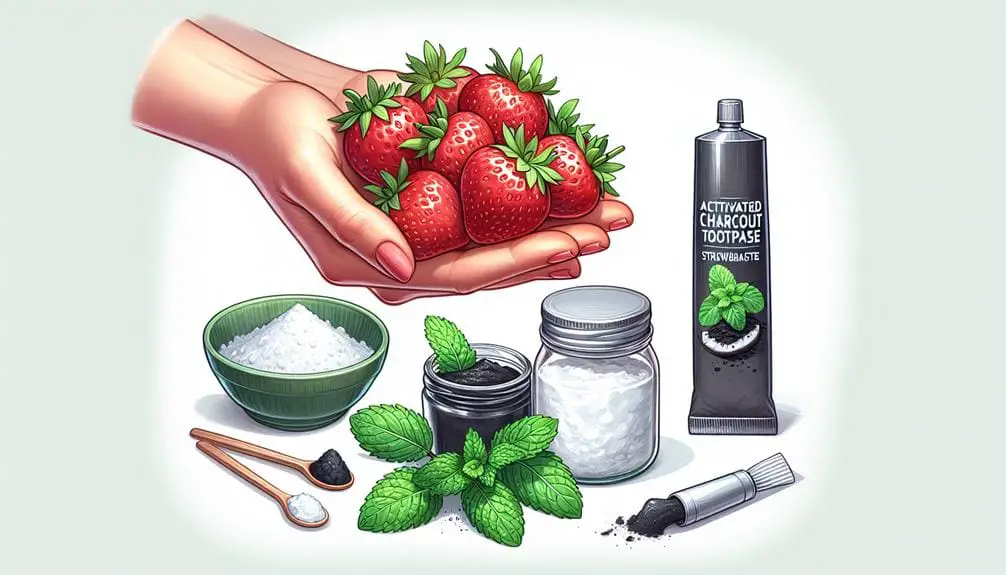Brighten your smile naturally with these five effective ingredients. Lemon juice's bleaching properties and citric acid can lighten stains, but dilute it with water to prevent enamel erosion. Baking soda acts as a mild abrasive, removing surface stains and neutralizing acids in your mouth, reducing the risk of decay. Coconut oil promotes dental health by reducing bacteria and plaque, contributing to teeth whitening. Strawberries contain malic acid for gentle whitening; mix with baking soda for a DIY paste. Activated charcoal absorbs toxins, removes stains, and polishes teeth gently. Try these ingredients to enhance your smile and oral health.
Key Points
- Lemon juice's citric acid lightens stains naturally.
- Baking soda removes surface stains and neutralizes acids.
- Coconut oil reduces plaque, fights bacteria, and whitens teeth.
- Strawberries contain malic acid for gentle whitening.
- Activated charcoal absorbs toxins, removes stains, and polishes teeth safely.
Lemon Juice
To effectively brighten your smile using natural ingredients, consider incorporating lemon juice into your oral care routine. Lemon juice is known for its natural bleaching properties that can help whiten your teeth. The citric acid in lemon juice has mild bleaching effects that can lighten stains on your teeth over time. However, it's important to use lemon juice cautiously as its acidity can erode tooth enamel if not used properly.
When using lemon juice for dental health, it's vital to dilute it with water to reduce its acidity. You can mix a small amount of lemon juice with an equal part of water and swish it around in your mouth for a minute or two before rinsing thoroughly. Remember not to leave lemon juice on your teeth for extended periods as it can harm your enamel. Additionally, it's recommended to brush your teeth before using lemon juice to prevent the acid from affecting your teeth when they're in a weakened state.
Incorporating lemon juice carefully into your oral care routine can be a natural way to enhance your smile's brightness.
Baking Soda
Consider incorporating baking soda into your oral care routine to further enhance the brightness of your smile. Baking soda, also known as sodium bicarbonate, offers both whitening and oral health benefits. Here are some reasons why you should include it in your dental regimen:
- Whitening Benefits: Baking soda has mild abrasive properties that can help remove surface stains from your teeth, making them appear whiter and brighter.
- Oral Health Benefits: It can help neutralize acids in your mouth, reducing the risk of tooth decay and gum disease.
- Freshens Breath: Baking soda can also help eliminate bad breath by neutralizing odors and creating a less hospitable environment for bacteria.
- Affordability: Compared to many commercial whitening products, baking soda is a cost-effective option that can deliver noticeable results over time.
Incorporating baking soda into your oral care routine can be a simple and effective way to improve the appearance of your smile while supporting your overall oral health.
Coconut Oil
Enhance your oral care routine by incorporating coconut oil, a natural ingredient known for its potential benefits in promoting dental health and whitening teeth. Coconut oil is widely used in a practice called oil pulling, where you swish a tablespoon of oil in your mouth for about 15-20 minutes. This process helps to remove harmful bacteria, reduce plaque buildup, and improve overall oral health.
Research suggests that coconut oil pulling can effectively reduce the number of harmful bacteria in the mouth, leading to fresher breath and decreased risk of cavities and gum disease. The lauric acid present in coconut oil has antimicrobial properties that can help combat bacteria responsible for dental issues.
In addition to its oral health benefits, coconut oil can also contribute to teeth whitening. By swishing coconut oil in your mouth regularly, you may notice a gradual improvement in the brightness of your teeth. Incorporating coconut oil into your oral care routine can be a natural and effective way to maintain a healthy smile.
Strawberries
Brighten your smile even further by exploring the teeth-whitening potential of incorporating strawberries into your oral care routine. Strawberries contain malic acid, an enzyme that can naturally whiten your teeth by breaking down stains on the enamel's surface.
Here are some essential points to keep in mind when utilizing strawberries for teeth whitening:
- Gentle Whitening: The natural bleaching properties of malic acid in strawberries can help lighten teeth gradually without causing sensitivity.
- Tooth Sensitivity: While strawberries can be effective in whitening teeth, they also contain sugar and acids that may lead to tooth sensitivity in some individuals. Rinse your mouth thoroughly after using them.
- DIY Whitening Paste: Mash up a ripe strawberry and mix it with baking soda to create a homemade teeth-whitening paste. Use this paste sparingly to avoid damaging your enamel.
- Consistency is Key: Incorporating strawberries into your oral care routine regularly, along with other proven whitening methods, can help you achieve a brighter smile over time.
Activated Charcoal
Activated charcoal is known for its ability to absorb toxins and impurities, making it a popular ingredient in various beauty and wellness products. When it comes to oral health, activated charcoal has gained traction for its potential to whiten teeth. This black powder may seem counterintuitive, but its health benefits for teeth whitening are supported by its adsorption properties, which help bind to and remove stains and plaque from the teeth's surface.
In the world of beauty trends, activated charcoal has become a go-to ingredient in teeth whitening products due to its ability to gently polish and whiten teeth without causing damage to the enamel. Despite its black appearance, activated charcoal is a safe and effective option for brightening your smile. It's increasingly being incorporated into toothpaste, powders, and even DIY teeth whitening remedies. Stay ahead in the beauty game by considering activated charcoal as a natural alternative for achieving a brighter smile.
Frequently Asked Questions
Can I Use Lemon Juice Directly on My Teeth to Whiten Them?
You shouldn't use lemon juice directly on your teeth to whiten them. Lemon juice risks tooth sensitivity due to its acidic nature. Consider natural whitening alternatives like strawberries or baking soda for a safer approach.
Is It Safe to Use Baking Soda as a Toothpaste Substitute for Whitening?
Using baking soda as a toothpaste substitute for whitening can be effective but may not be safe long term due to its abrasive nature. Alternatives like whitening toothpaste with baking soda are gentler and safer.
How Often Should I Use Coconut Oil Pulling for Teeth Whitening?
For teeth whitening with coconut oil pulling, it's ideal to do it a few times a week. This natural method not only helps remove stains but also promotes gum health by reducing harmful bacteria in your mouth.
Will Eating Strawberries Regularly Help Maintain a Bright Smile?
Eating strawberries regularly can help maintain a bright smile due to their natural whitening properties. However, be mindful of their sugar content which can contribute to tooth decay. Consider alternative whitening methods like professional treatments for more effective results.
Is Activated Charcoal Safe for Teeth Whitening and Does It Have Any Side Effects?
Activated charcoal, while effective for teeth whitening, may have drawbacks. Benefits include removing surface stains. Drawbacks may include abrasiveness and potential damage to enamel. Alternatives like professional whitening or whitening toothpaste may be safer options.



